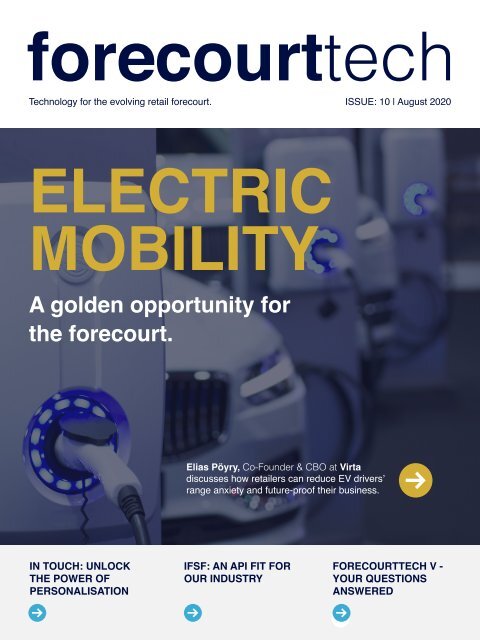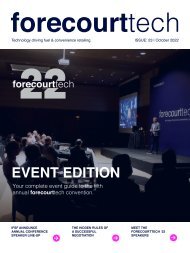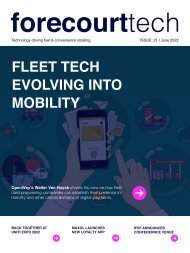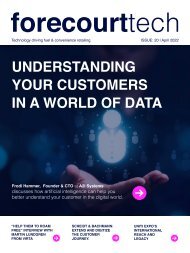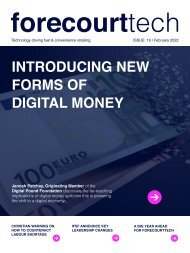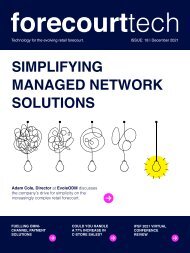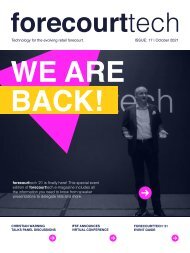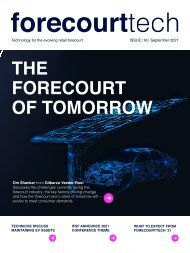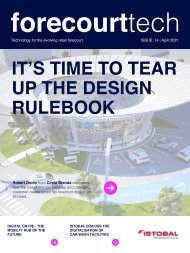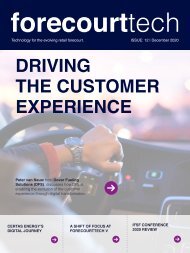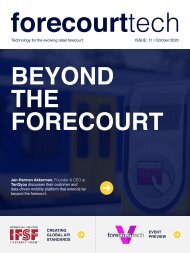forecourttech August 20
A bi-monthly technology magazine for the evolving retail forecourt.
A bi-monthly technology magazine for the evolving retail forecourt.
You also want an ePaper? Increase the reach of your titles
YUMPU automatically turns print PDFs into web optimized ePapers that Google loves.
Technology for the evolving retail forecourt.<br />
ISSUE: 10 | <strong>August</strong> <strong>20</strong><strong>20</strong><br />
ELECTRIC<br />
MOBILITY<br />
A golden opportunity for<br />
the forecourt.<br />
Elias Pöyry, Co-Founder & CBO at Virta<br />
discusses how retailers can reduce EV drivers’<br />
range anxiety and future-proof their business.<br />
IN TOUCH: UNLOCK<br />
THE POWER OF<br />
PERSONALISATION<br />
IFSF: AN API FIT FOR<br />
OUR INDUSTRY<br />
FORECOURTTECH V -<br />
YOUR QUESTIONS<br />
ANSWERED
<strong>forecourttech</strong><br />
Editor’s note<br />
The forecourt shop and technology have become<br />
the saviour of the retail forecourt and will only develop<br />
to offer a growing number of products and services,<br />
focusing on enhancing the customer experience as well<br />
as optimising the operation of the forecourt itself.<br />
In my opinion the modern day retail forecourt should<br />
look more like a stylish, one-stop mini shopping mall,<br />
stocking items that are tailored to local preferences. In<br />
this regard technology is already playing its role providing<br />
mobile functionality, self-checkout systems that use<br />
RFID chips to scan an entire basket and the ability to<br />
order food and drink directly to your door.<br />
Convenience and technology are also meeting when<br />
it comes to the connected car and voice recognition.<br />
This combination of voice control and connectivity<br />
allows drivers to safely reserve items while travelling,<br />
pre-order coffee, food or drinks, and even request that<br />
their click-and-collect order is brought out to them when<br />
they arrive at the forecourt. Connected cars are giving<br />
forecourt retailers the opportunity to imagine any number<br />
of different applications that enhance the customer<br />
experience.<br />
These and other technologies will be presented by our<br />
speakers at <strong>forecourttech</strong> V. in October. At <strong>forecourttech</strong><br />
V. you will also be able to pre-schedule meetings<br />
(virtually) with other delegates of choice - choosing from<br />
a listing of major oil companies, leading independent<br />
operators or industry providers of technology.<br />
pagethree<br />
For more information please visit www.<strong>forecourttech</strong>.<br />
com and I hope to have your participation at<br />
<strong>forecourttech</strong> V. in October.<br />
Ed.<br />
The <strong>forecourttech</strong> brand is owned and<br />
promoted by SAB Events Europe Ltd. All<br />
rights reserved.<br />
The views expressed in this magazine are<br />
those of the author and do not necessarily<br />
represent those of SAB Events Europe. No<br />
part of this electronic magazine may be<br />
copied or reproduced without the written consent<br />
of SAB Events Europe Ltd.<br />
Advertising:<br />
Stephen Bozdan<br />
stephen@sabevents.eu<br />
Features:<br />
Wendy Taylor<br />
wendy@sabevents.eu<br />
SAB Events Europe Ltd.<br />
The Quadrant<br />
Surrey<br />
KT17 4RH<br />
www.sabevents.eu<br />
#<strong>forecourttech</strong> @<strong>forecourttech</strong> www.<strong>forecourttech</strong>.com
<strong>forecourttech</strong><br />
News round-up<br />
AiFi, a cashierless checkout startup, has<br />
announced plans to deploy 330 new and<br />
retrofitted autonomous stores globally by the<br />
end of <strong>20</strong>21. AiFi’s Orchestrated Autonomous<br />
Store Infrastructure and Services (OASIS)<br />
tech platform can also be used to retrofit<br />
existing retail spaces with autonomous capabilities,<br />
allowing shoppers to simply walk in,<br />
grab what they want and leave. The system<br />
charges them automatically.<br />
Japanese convenience store, FamilyMart,<br />
has announced plans to use remote-control<br />
VR robots in their stores. The store chain’s<br />
partnership with Tokyo-based robotics firm<br />
Telexistence will see the remote-control<br />
robots stacking shelves in a bid to improve<br />
efficiency and reduce running costs.<br />
pagefour<br />
Cepsa has developed a new voice app that<br />
allows customers to search for the nearest<br />
Cepsa locations and their available services<br />
using Amazon’s cloud-based voice service,<br />
Alexa. Customers can also ask to find stations<br />
which offer particular products or services,<br />
such as 24 hours, car wash, convenience<br />
store, restaurant, autogas supply, electric<br />
charging facilities or fuel types.<br />
Toyota has announced a new sales milestone,<br />
surpassing three million hybrid EVs<br />
in Europe. The Japanese carmaker was the<br />
first company to offer mass electrification to<br />
customers, cutting vehicle emissions across<br />
the continent. Toyota remains at the top of the<br />
CO 2 reduction charts for mass market manufacturers.<br />
Following a successful 12-month pilot project<br />
at five of its retail sites, Aral, bp’s market leading<br />
fuel retail brand in Germany, is set to roll<br />
out more than 100 ultra-fast charging points<br />
across its retail network over the next 12<br />
months. The Aral chargers will be self-operated,<br />
powered by 100% green energy, with a<br />
charging capacity of up to 350kW. A vehicle<br />
with the appropriate battery technology can<br />
be charged for a range of up to 350 km in just<br />
over ten minutes.<br />
#<strong>forecourttech</strong> @<strong>forecourttech</strong> www.<strong>forecourttech</strong>.com
<strong>forecourttech</strong><br />
Uber Eats has joined up with supermarket,<br />
Asda, for the tech firm’s first step into fasttrack<br />
grocery delivery in the UK. Orders will<br />
be prepared in stores by Asda staff before<br />
being collected and delivered by couriers<br />
linked to the Uber Eats app, the takeaway<br />
delivery arm of the San Franciso-based tech<br />
firm behind the Uber ride-hailing app. The<br />
partnership is part of an increase in fast-track<br />
grocery delivery services during the coronavirus<br />
pandemic as shoppers have shifted<br />
towards buying food online.<br />
Amazon is expanding its real-world footprint<br />
with another unconventional physical product:<br />
a shopping cart. The Dash Cart is equipped<br />
with a touchscreen and other various hardware<br />
components to automatically detect<br />
what items you’re placing inside and even<br />
how many of those items you’ve picked off<br />
the shelf. When you finish your shop, you<br />
can take the cart through a special lane that<br />
checks you out digitally.<br />
pagefive<br />
Cepsa has expanded its agreement with<br />
delivery service, Glovo. The new deal will see<br />
the companies delivering basic food, hygiene<br />
and cleaning products from stores across<br />
Spain and Portugal. The initial agreement was<br />
struck during the first wave of the coronavirus<br />
pandemic and helped customers to access<br />
products when they needed them through<br />
contactless deliveries.<br />
A new survey has identified how convenience<br />
stores have shifted technology priorities<br />
during the pandemic. The survey from Censuswide,<br />
on behalf of Zynstra, said eighty-one<br />
percent of c-store retailers said COVID-19<br />
has elevated the role IT plays in the eyes of<br />
C-level decision makers, with 100% of c-store<br />
retailers with 500+ stores identifying this as a<br />
new reality. Sixty-four percent of respondents<br />
identified the need to adapt their technology<br />
to keep up with new consumer behaviours.<br />
Amazon will offer free grocery delivery to its<br />
Prime members across the UK by the end of<br />
the year, threatening efforts by supermarkets<br />
to profit from the boom in online shopping<br />
during the pandemic.<br />
The spread of the coronavirus has led to a<br />
surge in the adoption in contactless payment<br />
methods. A report released by global<br />
data and insights firm Dynata, surveyed over<br />
11,000 consumers in 11 countries and found<br />
a universal uptick in the adoption of contactless<br />
payments.<br />
#<strong>forecourttech</strong> @<strong>forecourttech</strong> www.<strong>forecourttech</strong>.com
<strong>forecourttech</strong><br />
FORECOURTTECH V<br />
LIVE UPDATE<br />
pagesix<br />
The coronavirus pandemic has impacted businesses<br />
the world over. The businesses who have not just survived,<br />
but thrived during COVID-19 are the ones who have been<br />
able to quickly adapt to the new normal. Bringing our<br />
international group of delegates together in the beautiful<br />
surroundings of the Asia Gardens Hotel and Thai Spa was<br />
simply not feasible in the current climate. So, just like so<br />
many of the companies we work with, we employed the<br />
right technology and we have adapted.<br />
This year <strong>forecourttech</strong> becomes <strong>forecourttech</strong> V, with the<br />
‘V’ standing for virtual. Delegates will hear from the same<br />
innovative speakers and be able to create the same invaluable<br />
business connections from the comfort and safety of<br />
their home or office. The event will be powered by technology<br />
from video conferencing specialists Event Video and<br />
networking app Brella. Previous delegates will be familiar<br />
with Brella’s networking platform, which has been used at<br />
the past two <strong>forecourttech</strong> events to match delegates with<br />
relevant connections for their business.<br />
In a free webinar this month, prospective delegates were<br />
given a sneak peek of what they can expect from <strong>forecourttech</strong><br />
V. The webinar featured Stephen Bozdan, Managing<br />
Director of SAB Events Europe, organisers of <strong>forecourttech</strong>;<br />
Tom Caldwell, Forbes Technology Council Member and<br />
CTO of Techniche; Mark Wohltmann, Director of NACS<br />
Europe and Ian Brown, former IFSF President and was<br />
moderated by Ralph Cochrane, co-founder of Event Video.<br />
As well as showcasing the impressive technology set-up,<br />
the webinar also discussed some of the hot topics in the<br />
fuel retail industry from how retailers are using technology<br />
in innovative ways to adapt to the ‘new normal’ to futuristic-sounding<br />
technology that may not be as far away as<br />
you might think. VR robots, contactless payments, artificial<br />
intelligence, automation, asset monitoring, delivery services,<br />
APIs – technology is being using in a range of different<br />
ways to create a better customer experience, save money<br />
and improve efficiency.<br />
One thing is clear, there are plenty of reasons to be optimistic<br />
about the future of the fuel retail industry. You can<br />
watch the full webinar via the link above.<br />
<strong>forecourttech</strong> V will take place from 6-7 October <strong>20</strong><strong>20</strong>.<br />
To register or for further information visit<br />
www.<strong>forecourttech</strong>.com.<br />
#<strong>forecourttech</strong> @<strong>forecourttech</strong> www.<strong>forecourttech</strong>.com
A technology focused event<br />
for the smart retail forecourt.<br />
6-7 October <strong>20</strong><strong>20</strong><br />
www.<strong>forecourttech</strong>.com
<strong>forecourttech</strong><br />
Supplier news & insights<br />
Brunei Shell Marketing (BSM) has selected<br />
P97’s PetroZone® to enable the Shell Motorist<br />
App at 36 Sites across Brunei. The new<br />
mobile app, built on P97’s PetroZone mobile<br />
commerce platform, will enable motorists to<br />
locate the nearest BSM retail station, display<br />
fuel prices and list the services available at<br />
each station. The app will also enable secure,<br />
mobile payments with integrated loyalty,<br />
and personalised digital offers for both fuel<br />
purchase and in-store merchandise across<br />
BSM’s network.<br />
Dover Fueling Solutions has announced the<br />
launch of its highly anticipated DFS Anthem<br />
UX user experience platform. This revolutionary<br />
user experience platform is making<br />
its debut in North America on DFS’ Wayne<br />
Ovation® fuel dispenser. Featuring a 27”<br />
touchscreen display, super-intuitive functionality,<br />
personalised content, multi-language<br />
selection and multiple media options through<br />
DX Promote, part of the DFS DX connected<br />
solutions platform, the Anthem UX platform<br />
introduces consumers to a new kind of fueling<br />
experience.<br />
pageeight<br />
Gilbarco Veeder-Root has announced the<br />
introduction of a smart Level 2 electric vehicle<br />
charging station, Amps2Go, to its EV charging<br />
product portfolio in North America. The<br />
Amps2Go line of smart chargers, powered<br />
by SemaConnect, complements Gilbarco<br />
Veeder-Root’s existing e-Mobility solutions,<br />
and demonstrates the company’s continued<br />
commitment to making EV charging broadly<br />
accessible to all parts of the convenience and<br />
commercial and industrial industries.<br />
To support the development of a network<br />
of petrol stations in Poland under the AVIA<br />
brand, UNIMOT S.A. has chosen ICASA to<br />
streamline and centralise the management of<br />
their stations and fleet cards .<br />
International software and consulting company<br />
for the oil and gas industry, Implico, has<br />
celebrated another milestone in its on-going<br />
digitalisation journey. The “Connected Truck<br />
and Connected Depot 1.0” apps are now SAP<br />
certified. The cloud-based micro services<br />
offer tank terminal operators and their business<br />
partners significant benefits, such as<br />
more efficient, secure and transparent truck<br />
handling from entrance to exit. The certification<br />
underlines the added value the apps<br />
grant their users.<br />
#<strong>forecourttech</strong> @<strong>forecourttech</strong> www.<strong>forecourttech</strong>.com
<strong>forecourttech</strong><br />
Hectronic has equipped a highly frequented<br />
petrol station in the one of the most important<br />
freight transport sectors in Spain with<br />
HecFleet fuel terminals for AS 24. The <strong>20</strong><br />
fuel pumps in 10 lanes are not only used for<br />
their own fleet but are open to the passing<br />
heavy-duty traffic. AS 24, a European partner<br />
for transport professionals developing<br />
a truck-dedicated network and associated<br />
digital and tolls services has equipped five<br />
terminals on the site. The terminals are connected<br />
to the existing fuel pump infrastructure<br />
and now accept the AS 24 fuel card.<br />
The coronavirus pandemic has introduced<br />
new challenges for businesses all over the<br />
world — especially in the retail sector. In<br />
a new blog post, Carl von Sydow Director<br />
Self-Service, Americas at Diebold Nixdorf discusses<br />
how preparing for the post-pandemic<br />
environment will test retailers’ flexibility.<br />
The International Forecourt Standards Forum<br />
(IFSF) has this week confirmed that their<br />
annual conference will be taking place from<br />
10-12 November. The <strong>20</strong><strong>20</strong> conference will<br />
explore topics surrounding consumer experience,<br />
with a focus on how to enhance,<br />
improve and streamline consumer experience<br />
through new technology, initiatives and<br />
partnerships. There will be sessions each day<br />
to share exciting developments in the area of<br />
standard APIs including feedback sessions to<br />
understand which areas members would like<br />
the organisation to focus on in <strong>20</strong>21.<br />
Hectronic has added new functions to the<br />
easy2fuel app. The functional principle of the<br />
payment app is easy to explain: Upon onetime<br />
registration the suitable petrol station is<br />
suggested to the user via GPS; alternatively,<br />
the user can select from a list. In the next<br />
step, they select the respective petrol station<br />
and fuel pump. Then, the user authorises the<br />
fuelling process by PIN or fingerprint. Optionally,<br />
the mileage can also be recorded with<br />
every fuelling process. At unmanned sites<br />
the user can simply drive off and for those<br />
wanting to pay at the kiosk they can do so via<br />
a QR code in the app. Receipts are digitally<br />
archived. The latest app features include<br />
automatic mileage registration, which can<br />
be entered using a smartphone camera and<br />
individual price management.<br />
pagenine<br />
#<strong>forecourttech</strong> @<strong>forecourttech</strong> www.<strong>forecourttech</strong>.com
A GOLDEN<br />
OPPORTUNITY FOR<br />
THE FORECOURT<br />
Elias Pöyry Co-Founder & CBO at Virta<br />
discusses how electric mobility can relieve EV driver’s<br />
range anxiety and future-proof businesses.
<strong>forecourttech</strong><br />
pagetwelve<br />
The forecourt sector can alleviate EV drivers range<br />
anxiety and future-proof their business by offering EV<br />
charging services. And there are many sustainable business<br />
models to choose from.<br />
What comes to your mind when you hear the words<br />
“electric vehicle”? Tesla or some other EV brand? Climate<br />
change? Range anxiety? Or perhaps the word threat?<br />
The mainstreaming of electric cars is not a revolution but<br />
an evolution. And this evolution is on-going at an ever-accelerating<br />
speed. Global sales of internal combustion<br />
engine (ICE) passenger cars were sluggish in <strong>20</strong>19, but<br />
electric vehicles (EVs) had another record breaking year,<br />
registering a 40% year-on-year increase according to the<br />
IEA’s latest report. The global EV market demand is expected<br />
to reach $1,212.1 billion by <strong>20</strong>27. New electric car<br />
models are springing up and the price parity between ICE<br />
cars and EVs is predicted to be reached within the next<br />
couple of years.<br />
Recovery packages give a boost to clean mobility<br />
Ambitious policy announcements have been critical in stimulating<br />
the electric-vehicle rollout in major vehicle markets<br />
in recent years. This trend has only gained strength this<br />
year. At present, just about everyone is building recovery<br />
packages – from local to the European Union level.<br />
One of the recurring themes is green mobility. Germany’s<br />
economic stimulus package, for example, includes an increase<br />
in the government buyer incentives for electric cars,<br />
which brings the total purchase subsidy to over 9000 euros<br />
per vehicle. France has promised 7000 euros per vehicle<br />
and many other countries are promising even bigger sums.<br />
Then there’s the European Union’s 750 billion euro “green<br />
stimulus” package including <strong>20</strong> billion euros to boost sales<br />
of clean vehicles.<br />
Green your image and earn more<br />
An increase in EVs requires an increase in charging services.<br />
According to the market research, range anxiety is the<br />
main concern that is slowing down the adoption of electric<br />
vehicles. The European Commission estimates that we<br />
need roughly 2.8 million publicly-available charging points<br />
by <strong>20</strong>30 in Europe alone – some 15 times more than what<br />
is currently in place.<br />
Charging is, and will be, a must-have service for EV drivers<br />
anywhere they move. Customers will choose services<br />
based on where they can charge. When EV’s are as cheap<br />
to purchase as ICE cars, the market demand for charging<br />
services will explode.<br />
Forecourt retailers have a pivotal role to play in this story.<br />
EV charging offers an unforeseen business opportunity<br />
to the forecourt sector – to every business owner and<br />
manager who is willing to challenge the current business<br />
logic. Not only are EV charging services a new sustainable<br />
revenue stream, but they also enable you to give a facelift<br />
for your brand as a supporter of renewable energy and<br />
e-mobility.<br />
Make EV charging your honey pot<br />
Forecourt retailers have many options on how to future-<br />
#<strong>forecourttech</strong> @<strong>forecourttech</strong> www.<strong>forecourttech</strong>.com
<strong>forecourttech</strong><br />
proof their business with EV charging services.<br />
EV charging can act as a honey pot that attracts the right<br />
customers to your forecourt. Even with fast chargers, your<br />
customers would need to spend about <strong>20</strong> minutes at your<br />
retail location while their car batteries are charged. In the<br />
meanwhile, they will use this additional dwell time to use<br />
your other onsite services. Only a fraction of your on-premise<br />
revenue would come directly from EV charging but your<br />
food and beverage sales will grow significantly. In fact,<br />
thanks to EV charging, forecourt retailers can expect up to<br />
60% of their income to come from food-to-go, groceries,<br />
takeaway coffee and other retail sales.<br />
Charging hubs - the future buzz word<br />
The forecourt is of course a natural place to start, but the<br />
benefits of EV charging don’t stop there. On average, we<br />
spend around 60% of our time at home. EV drivers usually<br />
want to charge their vehicles at home during the night<br />
when they are sleeping. The demand for home charging<br />
services will only grow in the future and the good news is<br />
that no industry has yet claimed dominance of the home<br />
charging market.<br />
But what about the EV drivers who don’t have a personal<br />
garage or EV chargers available in their apartment building?<br />
There is an untapped opportunity for forecourt retailers<br />
to create public EV charging hubs around residential<br />
apartment homes.<br />
EV charging hubs are public stations solely dedicated to<br />
electric car charging. These “hubs” can be built either as<br />
standalone stations or directly on an existing forecourt<br />
premises. They would be especially valuable for areas<br />
with block apartments that don’t have enough EV charging<br />
stations or any EV chargers at all. And it’s not just the local<br />
residents who’ll be utilizing these EV charging hubs, their<br />
guests will too.<br />
Another big advantage to these local charging hubs is that<br />
they require much less power since they are designed for<br />
long-term charging (e.g. EVs charging overnight). For the<br />
forecourt retailer, this means there is no need for expensive<br />
electricity upgrade investments or complicated underground<br />
wiring. For charging hubs located in metropolitan<br />
areas, there is an additional opportunity to add parking<br />
fees on top of the charging services.<br />
Grow your fleet card customer accounts<br />
And what is the second place many of us spend a lot -<br />
often too much - time every weekday? The office. As a<br />
forecourt retailer, you can not only retain but also grow<br />
your existing fleet card customer and other B2B customer<br />
accounts by offering EV charging services at their office.<br />
You will also be likely to win over new B2C customers who<br />
are looking for a charging solutions.<br />
The golden opportunity here is that forecourt retailers<br />
can offer EV charging to all these locations with a single<br />
contract and no extra roaming charges to third parties. By<br />
registering as a customer, EV drivers can charge their cars<br />
no matter where they are: at your retail location, at home,<br />
at a charging hub or at the office. As the market matures,<br />
subscription-based business model will become mainstream<br />
also in the EV charging services. One thing is certain:<br />
forecourt sector’s future looks bright with EV charging.<br />
pagethirteen<br />
Elias is one of the speakers<br />
at <strong>forecourttech</strong> V, a virtual<br />
event taking place on the 6-7<br />
October <strong>20</strong><strong>20</strong>.<br />
For more information on<br />
Elias’ talk and other<br />
presentations please visit<br />
www.<strong>forecourttech</strong>.com/<br />
speakers<br />
#<strong>forecourttech</strong> @<strong>forecourttech</strong> www.<strong>forecourttech</strong>.com
UNLOCK THE<br />
POWER OF<br />
PERSONALISATION<br />
Intouch.com discusses how retailers can reap the benefits of<br />
an AI-driven personalisation platform, allowing them to<br />
engage in real-time with their consumers in-store.
<strong>forecourttech</strong><br />
Successful online retailers are creating highly<br />
personalised experiences in physical stores.<br />
CascadeCreatives - stock.adobe.com.<br />
pagesixteen<br />
For years, digital retailers have been using data to<br />
study online shoppers’ behaviour, predict their needs, and<br />
eliminate friction points from the decision-making process.<br />
As a result, they have optimised the shopping journey to<br />
where purchasing online is now low on cognitive stress.<br />
Now those same retailers are opening brick and mortar<br />
stores and applying the same complex data models in their<br />
own physical stores. However, unlike what’s been happening<br />
online, most physical retailers’ existing channels<br />
for in-store customer targeting lack relevancy and reach,<br />
diminishing profitability.<br />
For the most part forecourt retailers haven’t been leading<br />
the charge when it comes to in-store personalisation;<br />
posters, flyers and static signage can be seen in almost<br />
every forecourt you’ll step foot in. With the ever looming<br />
threat of decreasing footfall and electric vehicles it leaves<br />
us thinking - is that enough?<br />
The idea of change can often be daunting, especially with<br />
an abundance of new technology on the market. Luckily,<br />
in the case of instore personalisation, it’s not an overnight<br />
shift. Incremental changes over time can help future proof<br />
your business and remain relevant in an ever changing<br />
world.<br />
The changing landscape<br />
Forecourt retail is at the pinnacle of new age retail. With oil<br />
supplies dwindling and electric cars becoming the norm,<br />
these retailers will need to change over the next decade<br />
faster than any other if they aim to keep hold of their market<br />
share.<br />
Only 19% of forecourt shoppers cite fuel as their main reason<br />
for visiting, and nearly a quarter who visit a forecourt<br />
convenience store travel on foot rather than in a vehicle.<br />
The majority of forecourts no longer simply deliver petrol<br />
or diesel. They are retailers, offering the ability to fill up<br />
with fuel together with other services, such as food to go,<br />
convenience shopping and speciality coffee. Forecourts<br />
will need to evolve further to become destinations or else<br />
they will struggle to keep up with their competitors. Every<br />
day spent neglecting to adopt an innovative testing model<br />
is another day of lost market share.<br />
If forecourt retailers want to compete in an ever changing<br />
sales environment, it is now more essential than ever for<br />
them to increase basket-value in-store. The most obvious<br />
way to achieve this is by applying a real-time intelligent<br />
data model that consistently delivers unique in-store experiences,<br />
on-prem targeted campaigns, and highly personalised<br />
offerings.<br />
In the online world, retailers have control over the characteristics<br />
of the audience they are seeking to target with a<br />
specific product. It is easier to define the targeted audience<br />
in the online world with the aid of targeted promotions<br />
and ads which can be executed across different websites,<br />
apps, and services.<br />
However, forecourt retailers lack choice or say on who will<br />
walk into their store at any given moment. They need to<br />
target ads in real time to meet the personalised experience<br />
customers expect.<br />
The danger of electricity<br />
We are all acutely aware of the rise in electric vehicle<br />
production across the world. In recent years. No longer is<br />
it a faraway, futuristic concept. There has been a global<br />
increase in EV charging stations at forecourts. However,<br />
some countries are moving at a rapid pace. Take Norway<br />
for example, in March <strong>20</strong><strong>20</strong>, electric cars took 55% of market<br />
share. Interestingly, Norway is Europe’s second-largest<br />
oil producer, yet they are still shifting towards EVs<br />
#<strong>forecourttech</strong> @<strong>forecourttech</strong> www.<strong>forecourttech</strong>.com
<strong>forecourttech</strong><br />
Fuel margins are boarding negligible for retailers, rendering<br />
convenience purchases and customer loyalty<br />
necessary for survival, coupled with lower footfall means<br />
it’s important to have a convenience offering that keeps<br />
customers loyal whether they’re fueling up or not. In the UK<br />
the average basket size of 2.34 items and non-fuel spend<br />
of £6.065 means the ability to upsell customers through<br />
personalisation can have a huge impact on the bottom line.<br />
Know your audience<br />
Marketing campaigns are often done in cycles, for traditional<br />
paper display marketing no real-time data is taken<br />
into account. There is a start date, an end date and a set<br />
number of products. The decisions on what products<br />
should be chosen, the length of time for the ads, the sales<br />
data, is all guesstimated from the outset.<br />
The key to loyalty is understanding what it is the customer<br />
wants and giving it to them. In the digital world, personalisation<br />
is everywhere. Displaying recently viewed items or<br />
personalising product pages based on location are a few<br />
techniques used in eCommerce. Conversely, in-store retail<br />
has had a one size fits all approach to promotions.<br />
Experience is everything<br />
With all the change coming, it may seem like a scary time<br />
to be a forecourt retailer. However, there is always room<br />
for positive growth amid change. Currently it takes 3-4<br />
minutes to fill a car tank with petrol or diesel and after filling<br />
up customers can average less than 2 minutes in-store.<br />
This doesn’t give a lot of time for customers to shop, and<br />
contributes to a quite rushed, often uneventful experience.<br />
Today, Electric cars can take up to 40 minutes on a fast<br />
charge, and even with future technological advancements<br />
decreasing this over time, it still leaves customers with<br />
plenty of dwell time to spend at the forecourt.<br />
The successful forecourts will see a golden opportunity<br />
to develop ways to engage with customers and create<br />
positive personalised experiences for them. In-store experiences<br />
such as hair or nail salons may begin to pop up.<br />
In larger sites, there could be in-store cooking demonstrations<br />
that allow for forecourt retailers to engage with their<br />
customers and offer unique suggestions, such as ideas for<br />
dinner, with the ingredients for sale in the store.<br />
The price is right<br />
Dynamic pricing is everywhere. Hotels, airlines and even<br />
Amazon are changing their prices by the minute to reflect<br />
current market conditions. Traditionally, offline retailers’<br />
pricing has remained static whether there’s 1 or 1,000<br />
people in store.<br />
Capitalising on real time events by increasing the price<br />
by a few percent can lead to a huge increase in a company’s<br />
margin.Real-time data also enables retailers to trial<br />
their pricing strategies and optimise them to produce the<br />
most favourable returns for the business. A 1% increase in<br />
prices will result in a 10% improvement in profit for a business<br />
with 10% profit margin. Fluctuations in demand and<br />
the inability for retailers to dynamically adjust their prices<br />
can create large wastage and additional expenses to the<br />
business. This<br />
can often lead to long-term financial problems and a damaged<br />
reputation.<br />
Nearby events create irregular shopping patterns, such as<br />
increased sales of energy drinks and snacks. Digital ads<br />
create the agility to promote products specifically geared<br />
towards attendees of the event, generating even higher<br />
sales. Taking advantage of such an opportunity is not possible<br />
in the current forecourt retail environment. Targeting<br />
the specific individuals that will be making these purchases<br />
prior to an event like a football game is crucial.<br />
AI proves incredibly valuable in this equation compared<br />
to rule-based promotions. This is primarily because rulebased<br />
promotions will be set to strict parameters based on<br />
simple one or two dimensional metrics. AI however, will begin<br />
with these parameters to target a more specific context<br />
and even discover new pattern to target over time.<br />
Increasing operational efficiency<br />
When AI is integrated with promotions in order to help target<br />
shoppers more accurately, the targeting gets smarter<br />
over time. For example, if a promotion for a product is<br />
shown five times in ten minutes but no sales are made, the<br />
AI model re-trains itself to promote a different product during<br />
this time. This is done until it can consistently promote<br />
products based on the internal and external environment<br />
that ultimately increases the conversion ratio.<br />
Real-time pricing, as outlined previously, allows retailers<br />
the ability to influence demand for their products based on<br />
the internal environment (what products are in stock, what<br />
products are close to their sell-by date and who are the<br />
customers in the store) and external influences (weather,<br />
time of day, time of year, nearby events,<br />
trends on social media).<br />
79% of retailers are investing in personalisation, the most<br />
of any industry. This shows the importance of personalised<br />
promotion and the ROI that retailers are seeing. When footfall<br />
in the UK is down by an average of 82% retailers must<br />
ensure they’re doing everything in their power to get customers<br />
spending while in-store. 67% of consumers say it’s<br />
important for brands to automatically adjust their content<br />
based on their current context for a real-time personalised<br />
experience.<br />
Evoking an emotion<br />
To create an emotional response from your customers you<br />
must know your audience. Emotions are created through<br />
predictions of an outcome that your brain makes, therefore<br />
to understand what predictions that your customer will<br />
make, you must first know basic information about them.<br />
It is important to create a sense of emotion in the retail<br />
world, as emotions dictate our actions and also connect<br />
us. Personalisation can become a major factor in creating<br />
valuable emotions in a customer. A sense of acknowledgement<br />
is important for people’s instinctive need for a sense<br />
of belonging.<br />
pageseventeen<br />
#<strong>forecourttech</strong> @<strong>forecourttech</strong> www.<strong>forecourttech</strong>.com
<strong>forecourttech</strong><br />
Secondly, people deeply value personalisation, a notable<br />
example being a gift. You are much more likely to have an<br />
emotional response to a gift it is made personally for you.<br />
Personalisation in a retail level achieves a similar response<br />
as you feel better connected to the experience.<br />
Being an advocate means that you publicly support or<br />
recommend something. Having customers become brand<br />
advocates is one of the most effective forms of advertising<br />
as you are more likely to listen to the opinions of those who<br />
you trust. Personalisation when utilized correctly creates an<br />
environment for brand advocacy. If a customer feels as if<br />
the in-store personalisation a certain retailer offers creates<br />
a far better experience, they will pass on this feeling to<br />
their network. This leads to the people who have been told<br />
about the experience to witness it for themselves, and they<br />
too will hopefully advocate for the brand if they feel that it<br />
made a positive impact.<br />
Trust goes both ways<br />
Gaining trust with your customer takes a long period of<br />
time and is built on reliability. Personalisation can become<br />
a major factor in being able to build trust with customers.<br />
Creating transparency between retailer and customer is<br />
beneficial for both parties.<br />
Sharing reliable and updated promotions makes the<br />
customers feel as if they are getting the best deal. Having<br />
a tailored shopping experience allows the customer to<br />
constantly feel as if they are at the top of the retailers mind.<br />
This can be a major factor in building this trust. However,<br />
when used incorrectly the information required for a truly<br />
personalised experience can create irreversible damage<br />
of trust. The most notable case of this was Facebook’s<br />
Cambridge Analytica scandal. The misuse of personal data<br />
led to trust in Facebook dropping 66 percent.<br />
Creating a loyal customer base is important to the longevity<br />
of a company. Loyal customers will continue to choose a<br />
retailer over a competitor regardless of major differences<br />
between the two. Loyalty comes from a strong sense of<br />
trust and belonging with an organization. Personalisation<br />
helps foster this loyalty through helping to build the sense<br />
of trust.<br />
The future of forecourt<br />
With so much technology to choose from, difficult decisions<br />
need to be made about what direction is best for forecourt<br />
retailers. It may seem like an arduous task, but frankly, we<br />
are at a point now where doing nothing and operating as<br />
normal may be detrimental to the future of forecourts. Providing<br />
customers with the digital experiences they expect<br />
in parallel with a stellar product offering will build<br />
generational loyalty.<br />
See the full report at www.intouch.com.<br />
Tomorrow’s<br />
Energy<br />
Management,<br />
Today.<br />
A cloud-based software suite<br />
to manage all your energy<br />
www.ICASA-group.com
AN API FIT<br />
FOR OUR<br />
INDUSTRY<br />
John Carrier, Projects Manager at IFSF<br />
discusses the work IFSF and Connexus have been<br />
conducting on Application Programming Interfaces.
<strong>forecourttech</strong><br />
pagetwenty<br />
Since January <strong>20</strong>19 IFSF and Conexxus have worked<br />
with their retailer and supplier (developer) members to<br />
assemble a set of documents to describe how to create an<br />
Application Programme Interface (API) for consideration<br />
as an industry standard. While there are many languages,<br />
formats, and tools available to create APIs, we focussed<br />
on those that are most standardized, and most likely to be<br />
useful in a variety of the environments in Fuel Retailing and<br />
Convenience Store computing.<br />
Alongside Conexxus, IFSF published in February some key<br />
“API Design Guidelines”. These are in the public domain<br />
and can be found at https://gitlab.openretailing.org/public-standards/api-design-guidelines.<br />
Rationale for selections<br />
Specifically, the IFSF singled out the following tools and<br />
standards as having the broadest scope:<br />
• Open API Specification 3.0 - formerly “Swagger,” this<br />
API definition format has become the de facto standard for<br />
APIs.<br />
• JSON-Schema 0.7 - as standards bodies, we require a<br />
way to define and compose message content. JSON-Schema<br />
is the emerging standard in JSON family of tools and is<br />
compatible with OAS 3.0.<br />
• HTML5 - Capabilities in HTML are ubiquitous and are<br />
included in almost all server and client side development<br />
environments.<br />
Framework documents<br />
API Design Rules for JSON<br />
This document describes the Open Retailing (fuel retailing<br />
and convenience store) style guidelines for the use of<br />
JSON based APIs, including property and object naming<br />
conventions. These guidelines are based on best practice<br />
gleaned from IFSF, Conexxus, OMG (IXRetail), W3C, Amazon,<br />
Open API Standard and other industry bodies.<br />
API Implementation Guide - Security<br />
This document describes the Fuel Retailing and Convenience<br />
Store API implementation guidelines for security.<br />
API Implementation Guide - Transport Alternatives<br />
This document describes the Fuel Retailing and Convenience<br />
Store transport layer alternatives for RESTful web<br />
services carrying JSON based APIs, as well as some jus<br />
tification for the selections made. Although this document<br />
contains many HTTP based alternatives for each functional<br />
Use Case only one is specified. Although this reduces<br />
choice it promotes interoperability and simplifies development<br />
and testing.<br />
Design Rules for APIs OAS 3.0<br />
This document describes the Open Retailing (fuel retailing<br />
and convenience store) style guidelines for the use of<br />
RESTful Web Service APIs, specifically the use of the<br />
OAS3.0 file format and referencing of relevant JSON<br />
Schemas from that file. These guidelines are based on<br />
best practice gleaned from OMG (IXRetail), W3C, Amazon,<br />
Open API Standard and other industry bodies. These<br />
guidelines are not to be considered a primer for how to<br />
create APIs. There are thousands of documents and blog<br />
posts about APIs and best practices for creating them. This<br />
guide is rather a set of practices to serve as “guardrails” to<br />
ensure that Open Retailing APIs have a consistent design.<br />
Joint API Data Dictionary (proposed)<br />
This is the API Data Dictionary (“Dictionary”), jointly owned<br />
by the IFSF (www.ifsf.org) and Conexxus (www.conexxus.<br />
org), and shared in order to assist in the use of our international<br />
standards. The Dictionary is open to the public and<br />
everybody is allowed to use them. For example, we expect<br />
many users will find the Dictionary helpful to understand<br />
fuel retailing and to define further innovative and collaborative<br />
APIs.<br />
More information and next steps<br />
If you have comments, or would like IFSF to consider<br />
changes to any of these items, please either open an issue<br />
in GitLab (available to IFSF members) or email support@<br />
openretailing.org.<br />
Published APIs<br />
Between <strong>20</strong>15 and <strong>20</strong>18 IFSF published API-Groups<br />
covering five business domains; Remote Equipment and<br />
Monitoring [REMC], Wet Stock Management [WSM], Prices<br />
(fuel and car wash), POS2FDC [FDC] and Mobile Payment<br />
[MP]. The XML and TCP/IP based implementations of<br />
these functional use cases were migrated to Web Services<br />
and JSON-based messages. Following collaboration with<br />
Conexxus, we have now reworked these to be complaint<br />
with the Design Guides and Dictionary. These are all in<br />
draft status awaiting final technical and business review.<br />
They are currently accessible to both IFSF and Conexxus<br />
members in the Gitlab.Openretailing.org repositories by<br />
requesting access by emailing support@openretailing.org.<br />
Prototype forecourt device simulator<br />
Both IFSF and Conexxus wanted to be sure that the API<br />
Groups developed using the aforementioned Design<br />
Guide and Dictionary were practical and actually worked.<br />
To confirm this a prototype forecourt device simulator<br />
was constructed using the published draft FDC API’s. To<br />
demonstrate the speed and reuse of the API-Groups the<br />
simulator and a POS MMI and FDC MMI were developed in<br />
under 6 man-days. The specified transport alternative was<br />
SSE (Server Sent Events) and these alongside a subset of<br />
the FDC API-Group is available for anybody with a browser.<br />
To start the POS MMI visit: https://tools.openretailing.org/<br />
cd/cdui/cdui.html In a separate window the Fuelling Point:<br />
https://tools.openretailing.org/fp/fpui/fpui.html<br />
#<strong>forecourttech</strong> @<strong>forecourttech</strong> www.<strong>forecourttech</strong>.com
<strong>forecourttech</strong><br />
Sample FDC MMI created using the published draft<br />
FDC APIs.<br />
Sample POS MMI created using the published<br />
draft FDC APIs.<br />
pagetwentyone<br />
John Carrier and Heather<br />
Price from IFSF will both be<br />
part of <strong>forecourttech</strong> V, a<br />
virtual event taking place on<br />
the 6-7 October <strong>20</strong><strong>20</strong>.<br />
Heather will moderate the<br />
event and you can find more<br />
information on John’s talk and<br />
other presentations at<br />
www.<strong>forecourttech</strong>.com/<br />
speakers<br />
#<strong>forecourttech</strong> @<strong>forecourttech</strong> www.<strong>forecourttech</strong>.com
Explore how you can benefit from Way4 — openwaygroup.com<br />
fleet cards<br />
under<br />
contr<br />
l<br />
As a fuel retailer, you want a smooth journey for corporate drivers<br />
and the best experience at your petrol stations for individual customers.<br />
They deserve the most recent payment innovations you can offer.<br />
But if your card system or service provider is too slow to keep up,<br />
you lose control over how and when you roll out new services.<br />
By switching to Way4, an open digital payments platform, fuel retailers are securing their digital future<br />
by choosing a partner that lets them be fast & flexible.<br />
ADVANTAGES:<br />
— CROSS–BORDER CARD BUSINESS ON A SINGLE PLATFORM<br />
— ISSUING & ACCEPTANCE OF FUEL & BANK CARDS, LOYALTY & COMBINED CARDS<br />
— SET UP OF CARD PRODUCTS & TRANSACTION RULES WITHOUT SYSTEM CUSTOMIZATION & VENDOR INVOLVEMENT<br />
— REAL–TIME ACCOUNT UPDATES FOR FLEET MANAGERS & DRIVERS THROUGH WEB PORTALS<br />
— 24 / 7 / 365 SERVICE AVAILABILITY<br />
— MOBILE PAYMENTS, LOYALTY PROGRAMS BASED OF BASKET DATA ANALYSIS, DYNAMIC PRICING<br />
Join the fuel retailers worldwide who are using Way4 for card issuing, acquiring, switching,<br />
digital channels, mobile wallet, e–commerce gateway & loyalty.
<strong>forecourttech</strong><br />
Providers of smart & evolving technologies<br />
optimising the retail forecourt.<br />
a2i systems A/S<br />
+45 2611 <strong>20</strong>85<br />
www.a2isystems.com<br />
Bever Innovations<br />
+31 111 745 400<br />
www.beverinnovations.com<br />
Actual IT<br />
+386 5662 2700<br />
www.actual-it.si<br />
BigBrother<br />
+31 318 666 699<br />
www.bigbrother.nl<br />
AGS Transact Technologies<br />
+91 22 4576 6666<br />
www.agsindia.com<br />
Bottomline<br />
+31 73 658 0480<br />
www.bottomline.eu<br />
pagetwentythree<br />
ASIS Automation<br />
+90 216 540 6464<br />
www.asis.com.tr<br />
Diebold Nixdorf<br />
+49 2103 900<br />
www.dieboldnixdorf.com<br />
Astro Baltics<br />
+372 6280 000<br />
www.astrobaltics.eu<br />
Dover Fueling Solutions<br />
+44 1382 598 000<br />
www.doverfuelingsolutions.com<br />
Azpiral<br />
+353 61 633 355<br />
www.azpiral.com<br />
Dürr Technik GmbH & Co. KG<br />
+49 7142 9022-0<br />
www.duerr-technik.com<br />
#<strong>forecourttech</strong> @<strong>forecourttech</strong> www.<strong>forecourttech</strong>.com
<strong>forecourttech</strong><br />
Providers of smart & evolving technologies<br />
optimising the retail forecourt.<br />
Edge Petrol<br />
+44 <strong>20</strong>3 865 8689<br />
www.edgepetrol.com<br />
Implico<br />
+49 40 27 09 360<br />
www.implico.com<br />
Faschang Service & Management<br />
+43 7723 44 600<br />
www.faschang.eu<br />
Ingenico<br />
+33 1 5801 8000<br />
www.ingenico.com<br />
pagetwentyfour<br />
Gilbarco Veeder-Root<br />
+44 1268 533090<br />
www.gilbarco.com<br />
Invenco Group<br />
-<br />
www.invenco.com<br />
Hectronic<br />
+49 7703 93880<br />
www.hectronic.com<br />
Istobal<br />
+34 902 509 444<br />
www.istobal.com<br />
Kalibrate<br />
+44 161 609 4000<br />
www.kalibrate.com<br />
Kouros<br />
+30 22950 45000<br />
www.kourossa.gr<br />
#<strong>forecourttech</strong> @<strong>forecourttech</strong> www.<strong>forecourttech</strong>.com
<strong>forecourttech</strong><br />
Mepsan<br />
+90 216 540 36 90<br />
www.mepsan.com.tr<br />
P97<br />
-<br />
www.p97.com<br />
NCR<br />
1-937-445-1936<br />
www.ncr.com<br />
PDI Software<br />
+49 69 8237960<br />
www.pdisoftware.com<br />
ONEY<br />
+34 911 774 707<br />
comercios.oney.es<br />
pagetwentyfive<br />
REPL<br />
+44 808 <strong>20</strong>0 7375<br />
www.replgroup.com<br />
Orbis Tech<br />
+44 2380 227645<br />
www.orbistech.com<br />
SGB<br />
+49 271 489640<br />
www.sgb.de<br />
#<strong>forecourttech</strong> @<strong>forecourttech</strong> www.<strong>forecourttech</strong>.com
<strong>forecourttech</strong><br />
Providers of smart & evolving technologies<br />
optimising the retail forecourt.<br />
Tammerneon<br />
+358 3 2831 111<br />
www.tammerneon.com<br />
Unicode Systems<br />
+4<strong>20</strong> 568 840 678<br />
www.unicodesys.cz<br />
Virta Ltd.<br />
+358 40 510 0312<br />
www.virta.global<br />
pagetwentysix<br />
Worldline<br />
+33 1 3434 9595<br />
www.worldline.com<br />
Stand out from the crowd and direct<br />
clients straight to your website for<br />
just €100 per month.<br />
Contact stephen@sabevents.eu<br />
for more information.<br />
#<strong>forecourttech</strong> @<strong>forecourttech</strong> www.<strong>forecourttech</strong>.com


